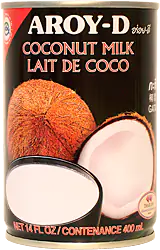
Thick coconut milk for many dishes of Thai cuisine.
unit: 400 ml
brand: Aroy-D
Coconut milk is made from pressing fresh and ripe coconuts. Not shaken, it naturally stratifies into water at the bottom and thick cream at the top of a can.
Preparation: Add to the prepared meal wherever it is necessary to use coconut milk or coconut cream.
Ingredients: coconut extract 70%, water, polysorbate 60 (E 435) as emulsifier
Coconut milk
Coconut milk
Coconut milk is not the sweet water found inside the coconut, but a thick cream squeezed from its well-ripe meat.
It is made by pressing chopped coconut flesh soaked in hot water. Sometimes the pulp is squeezed again to obtain the so-called light coconut milk.
A medium-sized, ripe coconut will yield about two cups of milk.
Good coconut milk has a pure, white color and the taste of good, slightly sweet cream with a coconut scent. If left still, it naturally separates: the coconut cream gathers at the top and the heavier water collects at the bottom. When recipes call for coconut cream, do not shake the can or carton, but use a spoon to get the thick cream from the top. When the weather is warm, it is a good idea to cool the can in the refrigerator beforehand, as the cream will harden and it will be easier to separate from the water.
It is not recommended to use light coconut milk as it is virtually tasteless. Usually, manufacturers add different types of flour to make it thicker and whiter than it actually is. A much better solution is to dilute good quality milk with water or directly in the dish.
You should not be afraid of saturated fatty acids contained in coconut milk, because they are good fatty acids, easily digestible and giving the body a quick dose of energy. Contrary to popular belief, they are not converted into bad cholesterol. In parts of the world where coconuts are the main source of fat, people do not suffer from heart disease. The main fatty acid in coconut milk is lauric acid, which is also abundant in breast milk and has a beneficial effect on brain and bone development. The antiviral, antifungal and antibacterial properties of coconut oil are used in the treatment of AIDS and mycosis.
Once opened, coconut milk should be stored in the refrigerator, but no longer than a few days. It should not be kept in the freezer as this increases the likelihood of it curdling while cooking. Do not use sweetened coconut milk in Thai dishes!
Coconut milk is the basis of most Thai curries. To prepare the curry sauce, first heat the coconut cream quite strongly, thanks to which the coconut oil is released and remains on the surface. Then curry paste is added to this oil and fried until the flavors of the herbs and spices are released and mixed, then the rest of the coconut milk is added. The finished curry will have a thin layer of oil on the surface. The oil brings out the color of the sauce: red, green or yellow, making the curries look very attractive.
8000 nutritional mleko kokosowe puszka (en)
Typical nutritional information
Source: manufacturer's data

 PL
PL  EN
EN